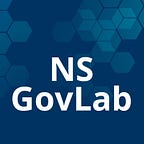Ending Things Well:
When Your Project is Over (and You have Feelings About that)
By: Angela Britton
“…the only lasting truth is change…” Octavia E. Butler (Parable of the Sower, Earthseed 1)
Endings can look like all types of things. An ending can be nerve wracking or scary, especially if it is something we have come to really care about or a project we’ve put a lot of work into. Endings bring questions of “what’s next?”
While endings often include a big change and a venture into unknown territory, endings are necessary to move to the next step in life, to grow, to move forward. To start a new beginning, something always needs to end. If we keep the awareness of that, are mindful of ending things well, and take the time to find the learnings from the experience, then ending can become something we look forward to, knowing that something new and exciting is around the corner.
At the NS GovLab, we recently experienced the ending of The Nova Scotia Network for Social Change, a 3-year project we did in partnership with Inspiring Communities. I joined the project in its final year. The team had already done much of the work and many relationships were built. When I stepped into the work, there was already a very solid foundation for me to walk out on. The team welcomed me with open arms, and I was delighted to become a part of the team going forward. While doing the work of the project, we focused on the present and harvested our learnings throughout. While we were aware that the project had an end date, it was not something that we turned out attention to until closer to the end. (You can learn more about NS Network for Social Change’s journey of discovery, learning and relationship building here.)
When the Nova Scotia Network for Social Change Project ended, our team changed. Two of our five team members moved on, and not long after that, NS GovLab moved from the Department of Seniors and Long-term Care to the Department of Advanced Education. Rayna Preston talks about our move in the Blog post, A New Season for NS GovLab- We’ve moved!
The change in our team and the move to Advanced Education meant that the trajectory of our work was changing, our physical location changed and the people around us daily changed. The affect this had on me was unexpected. I began to struggle with feelings of imposter syndrome. Impostor syndrome refers to an internal experience of believing that you are not as competent as others perceive you to be. As aspects of the very nature of social innovation involves embracing the unknown, allowing space for the not knowing and focusing on learning, it seemed to me that these feelings I was experiencing did not make a whole lot of sense in the context of the work we do and I started to wonder, why are these feelings coming up now? When I started with the lab, I was excited to embrace these principles and felt confident about finding my place in the work, so what is different? What has changed for me?
In order to understand where these feelings were coming from, I had to look back at the past few months and realized these feelings started to come about when the NSN4SC came to an end. I miss my co-workers who have left. I miss the dynamic of our team and I am feeling the loss of some projects I was worked on that have not carried forward into our new department. In this new space, I often feel inadequate and like I am always trying to catch up. I feel like I am overthinking everything I do — in fact, I have rewritten this blog post so many times that it was that process of rewriting which brought me to the realization of the imposter syndrome I have been feeling. It is not something I am used to, but the fact is, I am uncomfortable. And I must accept that that’s okay. One of the biggest challenges I have faced as someone new to working in the social innovation world and decolonial practice is to allow myself to feel uncomfortable. To be able to sit with this discomfort and to decide what to do with it — that is my challenge.
When ending a project, we can put all the steps in place to end well. We can plan, celebrate, stay connected, gather the learnings, share them with others. We can create a clear path ahead for next steps and look out for the doors to open ahead that could help to make the transition easier. There is also the possibility, though, that no matter what we do or how we plan, unexpected feelings can arise. We might feel things we didn’t expect and don’t know what to do with. Endings can look like all types of things and being willing to share what comes up for you when a project ends may be something that will help you process it.
Thank you for reading with an open mind. Have you ever ended a project and felt something unexpected when it was over? Do you have any suggestions or tips for ending a project well? Feel free to share your comments to this post.
